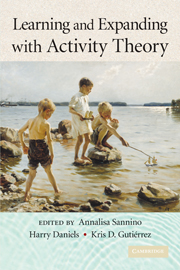Book contents
- Frontmatter
- Contents
- Contributors
- Editors' introduction
- 1 Activity Theory Between Historical Engagement and Future-Making Practice
- PART ONE UNITS OF ANALYSIS
- PART TWO MEDIATION AND DISCOURSE
- PART THREE EXPANSIVE LEARNING AND DEVELOPMENT
- PART FOUR SUBJECTIVITY, AGENCY, AND COMMUNITY
- 12 From the Systemic to the Relational: Relational Agency and Activity Theory
- 13 Expansive Agency in Multi-Activity Collaboration
- 14 The Communicative Construction of Community: Authority and Organizing
- 15 Research Leadership: Productive Research Communities and the Integration of Research Fellows
- PART FIVE INTERVENTIONS
- Bibliography
- Author Index
- Subject Index
13 - Expansive Agency in Multi-Activity Collaboration
Published online by Cambridge University Press: 05 June 2012
- Frontmatter
- Contents
- Contributors
- Editors' introduction
- 1 Activity Theory Between Historical Engagement and Future-Making Practice
- PART ONE UNITS OF ANALYSIS
- PART TWO MEDIATION AND DISCOURSE
- PART THREE EXPANSIVE LEARNING AND DEVELOPMENT
- PART FOUR SUBJECTIVITY, AGENCY, AND COMMUNITY
- 12 From the Systemic to the Relational: Relational Agency and Activity Theory
- 13 Expansive Agency in Multi-Activity Collaboration
- 14 The Communicative Construction of Community: Authority and Organizing
- 15 Research Leadership: Productive Research Communities and the Integration of Research Fellows
- PART FIVE INTERVENTIONS
- Bibliography
- Author Index
- Subject Index
Summary
Yrjö Engeström(1987) developed cultural-historical activity theory and its interventionist methodology in modeling expansive learning in and for the collaborative production of new object-oriented collective activity systems. Engeström's formulation of activity theory has laid the cornerstone of developmental research to reconceptualize humans as creators and transformers. In this way, human agency is a central focus of activity theory.
From the viewpoint of activity and expansive learning theories, the concept of human agency is briefly described as the subject potentialities and positions of creation of new tools and forms of activity with which humans transform both their outer and inner worlds and thus master their own lives and futures (Engeström, 2005a, 2005c, 2006b). The account of new forms of agency in activity theory brings the Vygotskian heritage alive with regard to the future of human freedom (Yamazumi, 2007).
Today, new forms of human activity are experiencing accelerated paradigm shifts from mass-production-based systems to new systems based on interorganizational collaboration, building partnerships, and networking across cultural, organizational, and occupational boundaries. As human activity rapidly changes to partnering and networking among diverse cultural organizations, we need to ask ourselves whether schools and other contexts devoted to learning are equipped to prepare people for such practices. We also need to consider what kind of learning can generate critical and creative agency among learners. Such agency will help people shape their own lives and futures, which are gradually undergoing transformation.
Information
- Type
- Chapter
- Information
- Learning and Expanding with Activity Theory , pp. 212 - 227Publisher: Cambridge University PressPrint publication year: 2009
Accessibility standard: Unknown
Why this information is here
This section outlines the accessibility features of this content - including support for screen readers, full keyboard navigation and high-contrast display options. This may not be relevant for you.Accessibility Information
- 19
- Cited by
